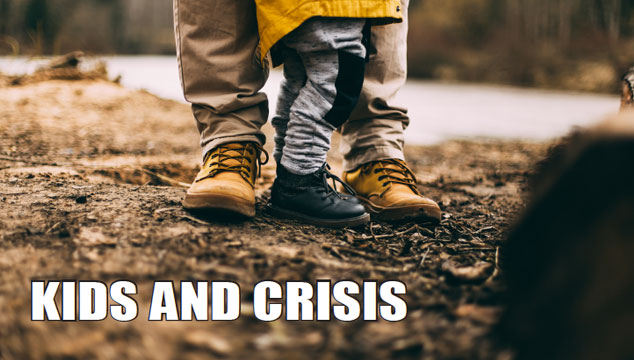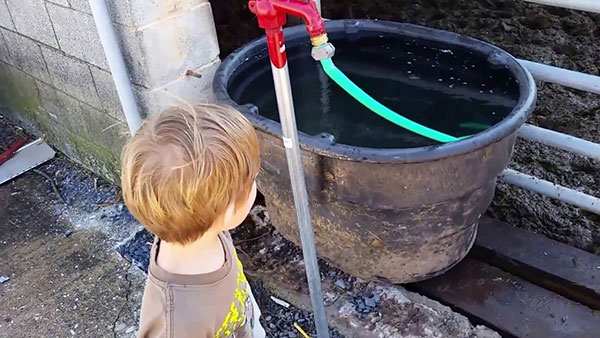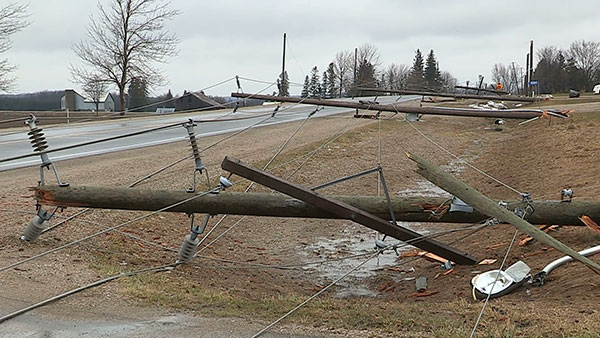
Lives are turned upside down after an event, be it manmade or natural. You will be scared, nervous, anxious, and under a lot of stress. The power and water may be out. Communications may also be down. These things will only increase the stress. Now imagine for a minute how your kids feel. The younger they are, the more profound the stress may be on them. Children key off the adults in their lives for comfort and security. If you’re having a hard time dealing with an event, imagine how that is magnified on them.
What can we do for children in the aftermath of an event? One of the most important things you can do to keep your kids calm is to talk to them. Talk about what has happened and what it means. You may think this a bad idea because it will upset them further.

The reality is that kids are smart and will know something is wrong. Ask them what they think has happened or what they know about the event, make sure to clear up any misunderstandings. Present the facts to them, boiled down so they understand, and without too much detail.
If the power is still on and communications are up, they may get some of their information that way. Social media is another avenue that could expose kids to what’s going on. The drawback is these can also expose them to rumor or bad information.

Not to mention the possibility for graphic images from the event. Keeping your kids away from social media as well as traditional media in the immediate aftermath of an event is a good idea. Control the information they get and try to protect them from that which may be unsettling.
This goes for adults as well. Naturally we need information in a crisis. But once you have a handle on what’s happening in your immediate area, it’s best to take time away from the coverage. A non-stop diet of news, of the same images being rehashed, and the talking heads all regurgitating the same talking points is not going to help your situation. It’s time to put your plan into action.

Part of your plan should include what to do with the kids in your life. Post event kids will often try to take care of their loved ones. They may ask if you’re okay and pester you with other questions. It’s their way of trying to help, to do something about what is happening around them.
The best thing you can do is make them part of the solution, not part of the problem. Give them a job or a couple of tasks they can handle. It will make them feel as though they’re helping. It will give them a sense of control over what’s going on, however little it may be in reality. Talk to them. If they’re sad, let them be sad. Simply telling them not to be won’t change anything. Acknowledge why they’re sad or scared and tell them that these tasks will help to make things better.
I live in hurricane country and my kids used to look forward to a hurricane coming. To them it was fun. Even when the power went out for a week or two. They got to use things they normally didn’t. It helped that school was out! But they also had jobs to do. One of their tasks was keeping the Berkey water filters topped off and making ice. They took these simple jobs seriously and worked diligently at them. They knew it would make it easier on all of us to have fresh filtered water and a cooler full of ice.
Assigning them tasks such as these keeps them out from under your feet and reduces the chances of your snapping at them in frustration. Snapping at them compounds the stress everyone is already feeling. Take time out to talk throughout the day. Kids can often become afraid to leave your side or even go into another room to play or sleep. It requires a concerted effort on your part to instill a sense of security, that everything will be alright.
Also, be conscious of the changes to your home, yard, and neighborhood. Make sure they are safe before sending them out to play. Downed power lines or overflowing sewer lines are a primary concern here.

Make sure these hazards don’t exist before they go out. Inspect the trees in your yard to insure there are no widowmaker spiders hanging in them. Don’t allow them to play in the water if there’s flooding. The sewer systems will be backed up and mixing with the flood water. All kids want to play in the water, explain to them what’s in it and why they shouldn’t.
Communication is the key just as it is with adults. It’s even more important with children. Take the time to talk, and more importantly, to listen to them. Don’t dismiss their thoughts out of hand, they very well may be seeing something you haven’t. Kids have eyes and ears too that can be an asset as well.
So talk and listen to them. Make them part of the solution, not part of the problem. Give them purpose and assure them that you’ll all get through this together. Try to remain calm as they will feed off whatever mood you present and amplify it upon themselves. Be prepared for headaches, tummy aches, and moodiness from them as these are all common conditions when kids are under stress. Control their access to images and information about what is going on. Be ready to correct any misunderstandings. Most importantly, let them know you’re there and that things will get better.
